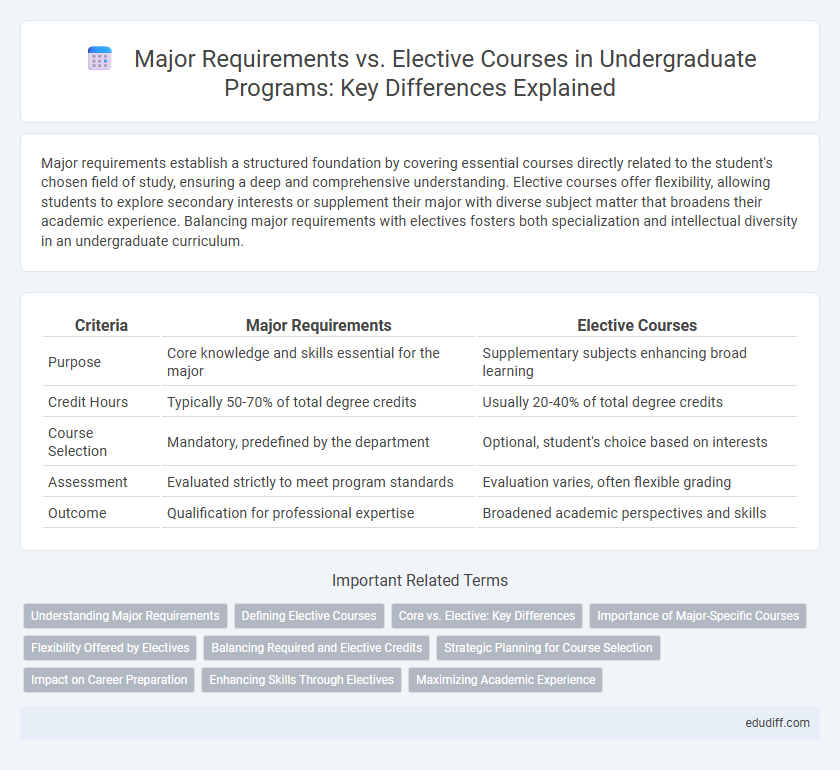Major requirements establish a structured foundation by covering essential courses directly related to the student's chosen field of study, ensuring a deep and comprehensive understanding. Elective courses offer flexibility, allowing students to explore secondary interests or supplement their major with diverse subject matter that broadens their academic experience. Balancing major requirements with electives fosters both specialization and intellectual diversity in an undergraduate curriculum.
Table of Comparison
| Criteria | Major Requirements | Elective Courses |
|---|---|---|
| Purpose | Core knowledge and skills essential for the major | Supplementary subjects enhancing broad learning |
| Credit Hours | Typically 50-70% of total degree credits | Usually 20-40% of total degree credits |
| Course Selection | Mandatory, predefined by the department | Optional, student's choice based on interests |
| Assessment | Evaluated strictly to meet program standards | Evaluation varies, often flexible grading |
| Outcome | Qualification for professional expertise | Broadened academic perspectives and skills |
Understanding Major Requirements
Understanding major requirements is crucial for undergraduate students to ensure timely graduation and mastery of their chosen field. Major requirements typically include core courses, prerequisites, and capstone projects designed to provide in-depth knowledge and skills essential for the discipline. Fulfilling these structured mandates differs from elective courses, which offer flexibility to explore interdisciplinary interests and enhance a well-rounded academic experience.
Defining Elective Courses
Elective courses refer to classes that students can choose freely outside their major requirements to explore diverse academic interests or develop complementary skills. Unlike major requirements, which are mandatory for degree completion in a specific field, electives offer flexibility and personalization in an undergraduate curriculum. Electives enhance a student's educational experience by fostering interdisciplinary knowledge and critical thinking beyond core study areas.
Core vs. Elective: Key Differences
Core courses are mandatory classes that provide foundational knowledge and skills essential to an undergraduate major, ensuring students meet the academic standards for graduation. Elective courses offer flexibility, allowing students to explore subjects outside their major or deepen expertise in specialized areas, contributing to a well-rounded education. The balance between core requirements and electives shapes the curriculum structure, influencing skill development and career readiness.
Importance of Major-Specific Courses
Major-specific courses form the core foundation of an undergraduate program, equipping students with specialized knowledge and skills essential for their chosen field. These courses directly align with academic and professional standards, ensuring graduates possess the competencies required for career success and advanced study. Elective courses, while offering breadth and exploration opportunities, complement rather than replace the critical expertise gained through major requirements.
Flexibility Offered by Electives
Elective courses provide significant flexibility within an undergraduate program by allowing students to explore diverse subjects outside their major requirements. This flexibility enables learners to tailor their education to personal interests and career goals, fostering a more well-rounded academic experience. Balancing core major requirements with elective options enhances critical thinking and adaptability skills crucial for professional success.
Balancing Required and Elective Credits
Balancing required and elective credits is crucial for undergraduate students to fulfill major requirements while exploring diverse academic interests. Major requirements typically mandate a specific number of credits in core subjects, ensuring foundational knowledge, whereas elective courses offer flexibility to pursue interdisciplinary skills and personal growth. Effective credit management allows students to graduate on time with a well-rounded education tailored to their career goals.
Strategic Planning for Course Selection
Strategic planning for course selection involves balancing major requirements with elective courses to optimize academic and career outcomes. Prioritizing core courses ensures mastery of fundamental concepts within the field, while thoughtfully chosen electives enhance interdisciplinary skills and personal interests. Leveraging academic advising and degree audit tools supports efficient progress toward graduation while aligning coursework with long-term goals.
Impact on Career Preparation
Major requirements provide in-depth knowledge and specialized skills essential for mastering a particular field, directly enhancing career readiness and expertise. Elective courses offer broader perspectives and interdisciplinary skills that foster adaptability, creativity, and problem-solving abilities in diverse professional settings. Balancing core major courses with strategic electives equips undergraduates with both specialized proficiency and versatile competencies valued by employers.
Enhancing Skills Through Electives
Elective courses complement major requirements by allowing undergraduates to explore diverse subjects that enhance critical thinking, communication, and problem-solving skills. These courses provide opportunities to acquire interdisciplinary knowledge and practical abilities not covered within the core curriculum. Electives thus play a crucial role in preparing students for versatile career paths and lifelong learning.
Maximizing Academic Experience
Major requirements provide a structured foundation ensuring mastery of core knowledge and skills essential for a specific field of study, directly contributing to degree completion and professional qualifications. Elective courses offer flexibility to explore diverse subjects, fostering interdisciplinary understanding and personal interests that enhance critical thinking and adaptability. Balancing major courses with thoughtfully chosen electives maximizes academic experience by combining depth with breadth, preparing students for both specialized careers and a dynamic job market.
Major Requirements vs Elective Courses Infographic

 edudiff.com
edudiff.com